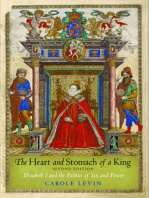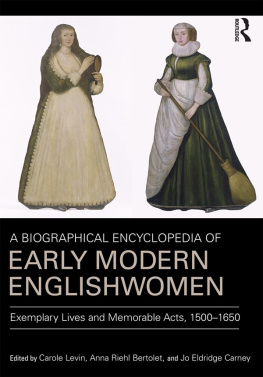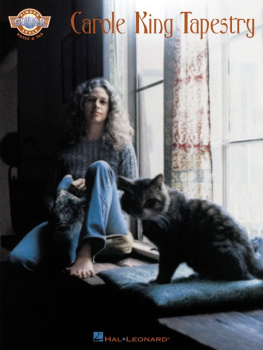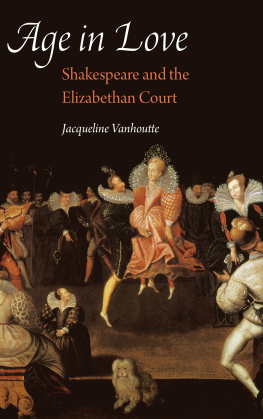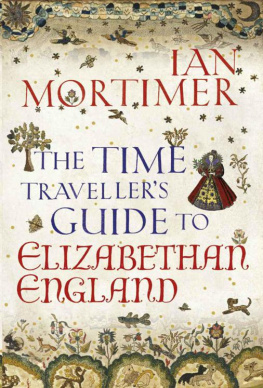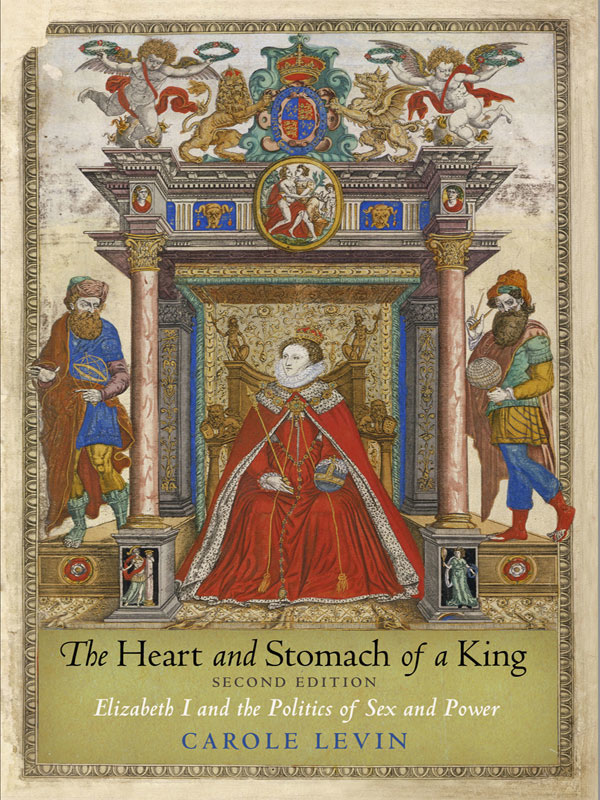
The Heart and Stomach of a King

Nicholas Hilliard, drawing of Elizabeth I. By permission of the Trustees of the British Museum.
The Heart and Stomach of a King
ELIZABETH I AND THE POLITICS OF SEX AND POWER
Carole Levin
SECOND EDITION
PENN
UNIVERSITY OF PENNSYLVANIA PRESS
PHILADELPHIA
Copyright 2013 University of Pennsylvania Press
All rights reserved. Except for brief quotations used for purposes of review or scholarly citation, none of this book may be reproduced in any form by any means without written permission from the publisher.
Published by
University of Pennsylvania Press
Philadelphia, Pennsylvania 19104-4112
www.upenn.edu/pennpress
Printed in the United States of America on acid-free paper
10 9 8 7 6 5 4 3 2 1
Library of Congress Cataloging-in-Publication Data
ISBN 978-0-8122-2240-1
To
Rohana, Sean, Milena, and Caleb;
Tristan, Carolynn, and Mina;
Leon, Wendy, Isaac, Millea, David, and Chanah
and to
Joe, Desire, and Debbie, dear former students,
dear always friends, also my family.
Contents
Illustrations
Preface to the Second Edition
Elizabeth Tudorbetter known as Elizabeth I, queen of England from 1558 to 1603is one of the most studied and mesmerizing historical personages. Her allure has many sources, just as she herself seemed to have many identities: she was an unwanted daughter born to a father who needed a son, she was an innocent political prisoner during her half-sister Marys bloody and dramatic reign, she was the Western worlds most eligible and elusive bride. Elizabeth reigned over great cultural flourishing and worked to maintain peace during a time of religious and political unrest in the rest of Europe, but she also served as a staunch protector of her country, defending England from the invading Spanish with, as she stated herself, the heart and stomach of a king.
Perhaps most impressively for a woman on a mans throne, Elizabeth ruled for almost forty-five years alone. She has often been described as one of the greatest of all English monarchs, and from her age until our own we have wanted to know more about her and her success. The first history of Elizabeths life and reign was published by William Camden in Latin in 1615, translated into English in 1 6 2 5 . At the end of the seventeenth century, Edmund Bohun in The Character of Queen Elizabeth claimed that Elizabeth had been celebrated not only in her times, but in all that have since followed, concluding that this celebration will continue to the end of the w o r l d . While this is certainly hyperbole, during the twentieth century more than a thousand nonfiction books in English were published about Elizabeth, with more than twenty released just in the last year. She has also been the subject of novels, plays, and movies, and there are books about her not only for adults but also aimed at a much younger audience, ranging from alphabet books to young adult novels and biographies. People are so fascinated by Elizabeth that her story has been used in a wide range of media, including full-color comic books depicting her defending England from the Spanish Armada and how-to texts suggesting that emulating her actions is a way to be successful in todays business w o r l d .
Why is Elizabeth so endlessly intriguing? Might it be the irony of her success as queen when her father so intensely wanted a son to rule after him? Or the fact of her brilliant political and survival savvy even as a young girl? Is part of our fascination because she was queen in the age of Shakespeare? Certainly some of Shakespeares strong female characters have evoked comparisons with Elizabeth. Perhaps people are most intrigued because at a time when power and femininity appeared antithetical, she ruled as an unmarried woman and was still highly successful.
Given the four centuries of fascination with Elizabeth, one might think that so much has been published and presented about her that there is nothing else to add. Despite all the representations of her, however, and despite all that we know about her life and her reign, she remains an elusive figure, with the keys to her success and the details of her personal life still shrouded in mystery.
And yet new and exciting scholarship about the queen continues to be published. In 1994 University of Pennsylvania Press published my own study, The Heart and Stomach of a King: Elizabeth I and the Politics of Sex and Power. I am proud of this work, as well as the scholarship that has followed which this work may have influenced. In this preface to the new edition I would like to discuss what is important about this study, how it fits into a scholarly field, and what impact it has had both on my own career and in the field of Renaissance studies.
I spent many years working on The Heart and Stomach of a K i n g , and my interest in Elizabeth went back far before I started work on this project. I read my first biography of Elizabeth when I was ten years old. Like so many young girls I was fascinated by Elizabeth, how she survived the many perils of her early life, how she triumphed, and it was an interest that has never left me. I am amazed by how many adults tell me they read or heard about Elizabeth as a child and continue to find her enthralling, though most of these peopleusually womendid not, like me, devote their lives to studying her. Elizabeth Tudor is a woman who captures the imagination and does not let it go. People want to know her life story.
While I used many biographical incidents in the writing of this book, The Heart and Stomach of a King is not a conventional biography. One reason I decided not to write a traditional biography is that there were so many biographies of Elizabeth already written, a number of them e x c e l l e n t . Rather, I wanted to explore how Elizabeth presented herself and how others responded to her as an unmarried woman in power. Coming of age during the second wave of the womens movement, these were issues I found compelling. So a central question initiating this study was how difficult it was for an unmarried woman to rule in sixteenth-century England and how effective she could be, given the cultural and political constraints imposed by the gender constructs of the time. As I was immersed in my exploration of Elizabeth from a new angle, other scholars were also bringing new theoretical and methodological approaches to the study of Elizabeth.
One of the earliest scholars to use a clearly stated feminist analysis to examine Elizabeth was Allison Heisch, whose 1980 article, Queen Elizabeth I and the Persistence of Patriarchy, anachronistically took the queen very much to task for embracing male ideas of how the world should work and for not supporting w o m e n . Alternatively, in 1988, Susan Bassnetts proclaimed feminist biography was extremely positive about Elizabeth without going deeply into some of the problems of her rule. Susan Frye used a variety of modern theoretical frames to examine three specific incidents in Elizabeths life and reignthe coronation pageant, the visit to Kenilworth in 1575, and the end of the reignto examine how a wide range of those around Elizabeth, such as her courtiers and poets, constructed the queen. Susan Dorans fine study of the various marriage negotiationsarguing that Elizabeth was more open to the idea of marriage than was formerly believedput gender less in the forefront of her a n a l y s i s .
Next page
